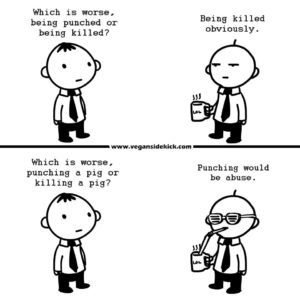
Vegan: Making Sense of an Often-Confusing Decision
Why Vegan?
A lot of people can benefit from an article on the rationale behind why someone would become vegan. Perhaps you’re not vegan but are interested in becoming one. Or perhaps you don’t want to go vegan, but you’re kind enough not to demand that your vegan coworkers explain themselves to you. Regardless of why you want to know, this article will help you to understand vegans and veganism more thoroughly.
While not every vegan shares all of the reasons below, most will be vegan for at least one of them. Reading this will help you to be a more understanding person, and can serve as a launching point for your further research.
Animal Rights
One of the primary reasons people go vegan is for animal rights. People who are vegan for this reason often believe that there is no humane way to kill someone who does not want to die. No matter how vehemently non-vegans on the internet argue that animals don’t feel pain, science is not on their side. Non-human animals have central nervous systems, and several studies have shown that they feel pain. With that, animal rights-based vegans don’t want to support a lifetime of immeasurable pain and suffering for others. Especially when it is so easy to find something else to eat.
But what about dairy and eggs? Non-vegans often don’t realize the suffering that goes into dairy and egg production. But, like humans, cows don’t produce milk unless they recently have given birth. This means that cows are forcibly impregnated, and their calves are usually taken away from them at birth to become meat. Both the dairy cows and the meat-destined cows generally live in cramped conditions, unable to move freely.

Egg production is similarly cruel, with egg-laying hens typically living in tiny boxes. According to the Humane Society, “On average, each caged laying hen is afforded only 67 square inches of cage space—less space than a single sheet of letter-sized paper on which to live her entire life.” Of course, some eggs don’t go straight to food. Instead, they are allowed to hatch to produce more egg-laying hens. But for those chicks unlucky enough to be born male, they are often killed on the spot. Most commonly this is by suffocation or by being ground alive.
Saving Your Health
So many non-vegans seem to think that being vegan is unhealthy. As a result, they claim that they could never become vegan because of health reasons. Looking at the science, though, this fear is largely unfounded. Vegans have lower rates of almost all of the top causes of death in the U.S., including heart disease, strokes, and various forms of cancer. Part of this is from the health-promoting properties they get from eating more fruits, vegetables, and whole grains than the average person. The other part is from avoiding the negative effects of many forms of meat, and the reduced acid load from avoiding meat.
This is not to say that any given vegan is necessarily healthier than any given meat-eater, though. A vegan who subsists on a diet high in refined grains, sugar, and oils can still be very unhealthy. But someone who goes vegan is statistically more likely to have positive health outcomes than if they never went vegan.
Saving the Environment
Some people go vegan because of their concern for the environment. With the talk of global warming and impending doom, it’s hard not to want to do what we can to help out.
According to the United Nations, 14.5% of global greenhouse gas emissions come from animal agriculture, including 4% just from dairy. This primarily stems from the methane produced by cows. If cows weren’t artificially inseminated to force pregnancy, the number of cows in the world would be greatly reduced.
In addition to the greenhouse gas emissions, livestock accounts for 70% of land used for agriculture. While it is true that the rain forest is being cut down largely to grow soy, nearly three-quarters of that soy is used to feed livestock. Overall, according to the World Bank, 91% of rain forest destruction is due to animal agriculture.
Due to the massive amount of land and crops needed to produce meat, it is also highly water-intensive to eat animals. On the whole, animal agriculture uses tons more water… literally!
Wrapping it Up
Those are the main reasons people go vegan. Each person’s reasons will vary, so you may find you’re more interested in one aspect over the others. You may also find unique reasons to embrace the decision. For example, some people go vegan for the ladies! Since 80% of vegans are female, if you are a vegan male, you are practically guaranteed to be in high demand! Just sayin’…
